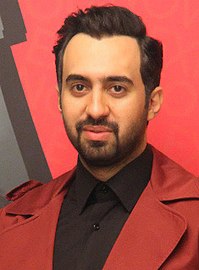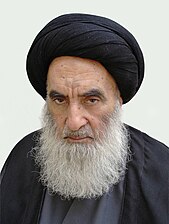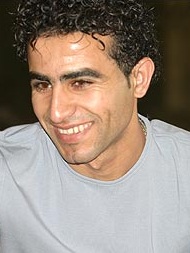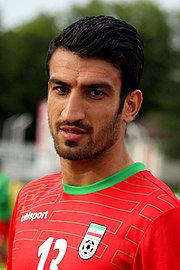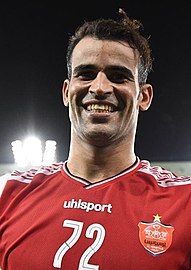List of Iranian Arabs
This is a list of Iranian Arab notable people, arranged by main profession and then birthdate. To avoid differences in nomenclature and identity, this list starts from the 16th century (early modern period), When the Safavids established a national state officially known as Persia or Iran and reasserted the Iranian identity of the region.[1]
The identity of Iranian Arab people and their affiliation are different, Arab identity itself is the objective or subjective state of perceiving oneself as an Arab and as relating to being Arab.[2] Their identities, like those of other Iranian cultural and ethnic identities, are based on a common culture-land-historical experience or traditional lineage. Today, these commonalities are generally regional and in the historical-tribal context, as many of them assimilated with the largest ethnic group in Iran, the Persians, and they are not identified except by sub-symbols such as Arabic surnames, including: Bani-Amiri, Asadi, Khazaei, Tamimi, etc, apart from Hashimi nasabs like: Mousavi, Hosseini, Hassani, Alavi, Tabatabai, Sadr, Fatemi, etc. Today, prominent Arab communities in Iran can be clearly seen through national, regional, or local identity. They come from various backgrounds in the scattered regions of present-day or historical Iran and are concentrated, especially in the southwest of the country where the Arabs of Khuzestan live. In the south, prominent groups of them live on the shores and islands of the Persian Gulf in the provinces of Hormozgan, Fars and Bushehr. Khorasan Arabs also live in cities and villages in the east and northeast of the country. Other groups of Iranian Arabs worth mentioning include immigrants to Iran from Arab countries and their descendants, especially from the Mashriq and the Arabian Peninsula, people of Arab tribes descent, naturalized Arab individuals of Iran and other Arab sub-communities settled in Iran or Iranian diaspora in Arab countries who became Arabized.[3]
Among the Arab-affiliated groups and ethnicities in present-day Iran are: Arab-Persians, people of mixed Arab and Persian ethnic or cultural background; Arabic-speaking Afro-Iranians and those who may be called Iranian Afro-Arabs; Assyrians and Mandaeans, both of which are natives of the Middle East and speak a branch of the Semitic languages that are closely related to Arabic, like the Iranian Jews; Iranian diaspora in Arab countries and vice versa, Arab expatriates in Iran who would not be included in the list unless they became permanent residents of Iran or are customarily considered as Iranian; Iranian Arabists etc.
This list is not automatically filled with notables from Arab regions in Iran such as Khuzestan or Hormozgan, but the following people have either stated that they are Arabs or that credible sources indicate that. To be included in this list, the person must have a Wikipedia article and references showing the person is Arab and Iranian.
Arts and entertainment
[edit]Actors and actresses
[edit]- Reza Fayazi - (6 July 1953, Ahvaz) director and actor; Khuzestani Arab.[4]
- Osamah Sami - (10 March 1983, Qom) stage and screen actor, writer, spoken word artist, and stand-up comedian; Iran-born Iraqi-Australian.[5]
Directors
[edit]- Shahriar Bahrani - (1951, Tehran) director; Iranian of Bahrani descent.[6]
- Mohammad Reza Fartousi - (16 July 1982, Ahvaz) producer, director and screenwriter; Khuzestani Arab.[7]
Singers and instrumentalists
[edit]- Mohammad Shahabi - (1962, Ahvaz - 25 December 2015, Mollasani) Santur player; Khuzestani Arab.[8]
- Mehdi Yarrahi - (14 November 1981, Ahvaz) pop singer; Khuzestani Arab.[9]
Painters and photographers
[edit]- Jassem Ghazbanpour - (31 May 1963, Khorramshahr) Freelance photographer; Khuzestani Arab. [citation needed]
Branches of science
[edit]- Abd al-Hussein al-Salihi - (8 January 1936, Karbala – 15 October 2014, Qazvin) Historian and religious writer; Iranian-Iraqi.[10]
- Yousef Azizi - (21 April 1951, Susangerd) Linguist and historian; Khuzestani Arab.[11]
- Kamal Eleanz - (21 January 1978, Kut-e Abdollah) Theologian and Linguist and philosopher; Khuzestani Arab.[12][13][14][15]
- Adnan Gharifi [16]
Literature
[edit]Fiction writers
[edit]Linguists and literary scholars
[edit]- Amir Mahmud Anvar - (15 November 1945, Tehran – 3 December 2012, Tehran) Iranian literary academic and poet; Musawi in ancestry, descended from Ni'matullah al-Jazayiri.[17]
Poets
[edit]Literary translators
[edit]- Ghassan Hamdan - (1973, Baghdad) literary translator and poet; Iranian-Iraqi.[18]
Law and jurisdiction
[edit]Victims
[edit]- Hashem Shabani - (1982, Ahvaz - 27 January 2014, Ahvaz) Teacher, poet, activist and torture victim; Khuzestani Arab.[19]
Media
[edit]Journalists
[edit]- Abbas Khalili - (1896, Najaf – 10 February 1972, Tehran) Journalist, diplomat, poet and novelist; Iranian-Iraqi.[20]
- Hasan Badi' - (1872, Kadhimiya -1937, Tehran) Journalist, writer, poet and diplomat; Iranian-Iraqi.[21]
Military
[edit]- Shahriar Shafiq - (15 March 1945, Cairo – 7 December 1979, Paris) Imperial Navy Captain and a member of the House of Pahlavi; Iranian-Egyptian.[22]
- Hamid Taqavi - (1955, Ahvaz – 27 December 2014, Samarra) IRGC commander; Khuzestani Arab.[23]
- Ali Shamkhani - (29 September 1955, Ahvaz) Navy admiral and IRGC commander; Khuzestani Arab.[24][25]
- Ali Qasim Hashemi - (31 December 1961, Ahvaz - 25 June 1988, Majnoon Island) IRGC commander; Khuzestani Arab.[26]
- Hassan Danaeifar - (1962, Shushtar) IRGC commander, civil engineer, diplomat and politician; Khuzestani Arab.[27]
Politics and government
[edit]- Hussein al-Shahristani (1942, Karbala) politician; Iraqi of Iranian descent, hails from the al-Shahristani family.[28]
Emirs
[edit]- Jabir Ibn Merdaw - (1780 – 1881) Emir of Arabistan; Khuzestani Arab.[29]
- Miz'al ibn Jabir - (18??, Muhammerah – 1897, Muhammerah) Emir of Arabistan; Khuzestani Arab.[30]
- Khazʽal Ibn Jabir - (18 August 1863, Basra – 24 May 1936, Tehran) Sheikh of Mohammerah and Emir of Arabistan; Khuzestani Arab.[31]
- Asadollah Alam - (24 July 1919, Birjand – 14 April 1978, New York) 40th Prime Minister of Iran, Emir of Qa'inat; Khorasani Arab,[32] Persinazed. [citation needed]
Diplomats
[edit]- Mugdaddy Hazoori Vokhshouri - (7 August 1948, Tehran) diplomat and former member of the Jordanian royal family; Iranian-Jordanian.[33]
- Ali Akbar Salehi - (24 March 1949, Karbala) academic, diplomat; Iranian-Iraqi.[34]
- Feisal al-Istrabadi (1962, Virginia) diplomat; Iraqi of Iranian descent, roots in Gorgan, formerly Isterabad.[35]
Members of parliament
[edit]Islamic Consultative Assembly
[edit]- Jasem Jaderi - (21 March 1957, Susangerd - March 10, 2021, Tehran) reformist politician and executive director, member of the 3rd, 4th and 5th; Khuzestani Arab.[36]
- Shabib Jovijari - (1967, Ahvaz) Member of the 7th, 8th and 11th; Khuzestani Arab.[37]
- Majid Naseri Nejad - (1967, Shadegan) Member of 11th; Khuzestani Arab.[38]
- Karim Hosseini - (1969, Shadegan) Member of 11th; Khuzestani Arab.
Assembly of Experts
[edit]- Muhammad-Ali al-Musawai al-Jazayiri - (1943); Khuzestani Arab.[39]
- Mohammad-Ali Taskhiri - (19 October 1944, Najaf) Ja'fari jurist, diplomat, religious writer and poet; Iranian-Iraqi.[40]
- Muhsin al-Araki - (1956, Najaf) Ja'fari jurist, university lecturer, and politician; Iranian-Iraqi.[41]
- Muhsin Haydari Al Kathir - (1957, Shush) Ja'fari jurist; Khuzestani Arab.[42]
- Abbas Ka'bi - (1962, Ahvaz) Ja'fari jurist; Khuzestani Arab.[43]
Political party members
[edit]- Fowzi Badavi Nejad - (?, Ahvaz) Member of DRFLA.[44]
Royal court
[edit]- Fawzia Fuad of Egypt - (5 November 1921, Alexandria – 2 July 2013, Alexandria) Queen consort of Iran 1941–1948; Naturalized Iranian-Egyptian.
- Shahnaz Pahlavi - (27 October 1940, Tehran) Pahlavi princess; Iranian-Egyptian-Swiss.[citation needed]
- Azadeh Shafiq - (1951, Tehran – 23 February 2011, Paris) Pahlavi princess; Iranian-Egyptian.[45]
Religion
[edit]Bahá'í figures
[edit]Iranian Bahá'í figures those related to the Arab world, except Baháʼu'lláh the prophet-founder of Baháʼí Faith, he who spent his exile life from 1863 in Ottoman Iraq and Palestine
- ʻAbdu'l-Bahá - (23 May 1844, Tehran – 28 November 1921, Haifa) Leader of the Baháʼí Faith; Iranian emigrant to the Ottoman Iraq and Palestine.[46]
- Mírzá Abu'l-Faḍl - (July 1844, Golpaygan - 21 January 1914, Cairo) Scholar, religious writer and missioner; Arabized, Iranian Egypt-based.[47]
- Mírzá Mihdí - (1848, Tehran – 23 June 1870, Haifa) Youngest child of Baháʼu'lláh; Ottoman-Palestinian Iranian.
- Mírzá Muhammad ʻAlí - (16 December 1853, Baghdad - 10 December 1937, Haifa) one of the sons of Bahá'u'lláh; Iraq-born Iranian.[48]
- Shoghi Effendi - (1 March 1897, Acre – 4 November 1957, London) Religious leader, Guardian of the Baháʼí Faith from 1921 to 1957; Arabized, Ottoman-Palestinian of Iranian descent.[49]
Islamic religious poets and writers
[edit]- Ahmad bin Ismail al-Jazyiri - (?, Al-Jazayir – 1736, Najaf) Ja'fari jurist, religious teacher and writer; Iranian-Iraqi of Khuzestani Asadi ancestry.[50]
- Ahmad al-Muhsini - (1744, Medina – 1831, Dowraq) Ja'fari jurist, religious and writer and poet; Iranian of Ahsa'i descent.[51]
- Muhammad Taha al-Huwayzi - (1899, Najaf – 4 April 1968, Ahvaz) Ja'fari jurist, religious teacher and poet; Iranian-Iraqi and Khuzestani Arab.[52]
- Muhammad bin Fadlallah al-Sarawi - (?, Pahneh Kola, Sari – May 1924, Najaf) Ja'fari jurist, religious writer and poet; Iranian-Iraqi of Hashemi Musawi ancestry.[53]
- Muhammad-Amin al-Imami al-Khu'i - (1885, Najaf - 1948, Tehran) Ja'fari jurist, religious writer and historian; Iranian Iraqi-born of Asadi ancestry.[54]
- Ibrahim al-Musawi al-Zanjani - (1925, Sain Qaleh, Abhar - 1999, ?) Ja'fari jurist, religious writer and teacher; Iranian-Iraqi of Musawi ancestry.[55]
Sufis and Islamic philosophers
[edit]- Baha' al-din al-'Amili - (18 February 1547, Baalbek – 1 September 1621, Isfahan) Islamic scholar, philosopher, writer and poet; Safavid Iranian.[56]
- Ahmad ibn Zayn al-'Abidin al-Alawi - (crica 1582, Jabal Amil - 1650, Isfahan) Islamic philosopher; Safavid Iranian.[57]
Islamic scholars and jurists
[edit]- Ni'matollah al-Jazayiri - (1640, Al-Sabbaghiyah -1701, Papil) Ja'fari jurist, religious writer and teacher; Safavid Iranian-Iraqi.[58]
- Al-Hurr al-Amili - (1624, Machghara -1693, Mashhad) Ja'fari jurist and qadi; Levantine Arab-Safavid Iranian.[59]
- Nur al-Din Nimatullah al-Jazayiri - (1677, Shushtar - 29 December 1745, Shushtar) Ja'fari jurist, linguist and writer; Safavid Iranian, Khuzestani Arab.[60]
- Kazim Rashti - (1793, Rasht –1 January 1843, Karbala) Ja'fari jurist; Iranian of Hejazi Hashimi descent, then Iranian-Iraqi.[61]
- Murtadha al-Ansari - (13 May 1800, Dezful - 18 November 1864, Najaf) Ja'fari jurist; Khuzestani Arab, then Iranian-Iraqi.[62]
- Abdullah Behbahani - (1840, Najaf - 16 July 1910, Tehran) Ja'fari jurist and a constitutional movement leader; Bahrani Iranian-Iraqi.[63]
- Muhammad Hossein Gharavi - (26 December 1878, Kadhimiya - 13 December 1942, Najaf) Ja'fari jurist, religious writer and poet; Iranian-Iraq.[64]
- Abu al-Qasim al-Khoei - (19 November 1899, Khoy - 8 August 1992, Kufa) Ja'fari jurist and marja'; Iranian-Iraqi.[65]
- Abbas al-Mohri - (1912, Mohri - 15 February 1988, Tehran) Ja'fari jurist; Iranian-Kuwaiti.[66]
- Musa al-Sadr - (4 June 1928, Qom – disappeared 31 August 1978, Libya) Ja'fari jurist and Islamic leader; Iranian-Lebanese.[67]
- Ali al-Sistani - (4 August 1930, Mashhad) Ja'fari jurist and marja'; Iranian-Iraqi.[68]
- Mahmoud Hashemi Shahroudi - (15 August 1948, Najaf – 24 December 2018, Tehran) Ja'fari jurist, qadi and politician; Iranian-Iraqi.[69]
Sports
[edit]Athletes
[edit]- Javad Hardani - (22 March 1984, Ahvaz) Paralympic athlete; Khuzestani Arab.[70]
- Hashemiyeh Motaghian - (22 May 1986, Ahvaz) Paralympic athlete; Khuzestani Arab.[71]
Basketball players
[edit]- Ali Doraghi - (20 September 1984, Ahvaz) basketball player; Khuzestani Arab.[72]
- Hamed Haddadi - (19 May 1985, Ahvaz) basketball player; Khuzestani Arab.[73]
Football players
[edit]- Karim Bavi - (30 December 1964, Abadan) Striker, retired; Khuzestani Arab.[74]
- Ebrahim Tahami - (21 September 1966, Abadan) Midfielder, retired; Khuzestani Arab.[75]
- Laith Nobari - (23 September 1977, Baghdad) Forward, retired; Iranian-Iraqi.[76]
- Jalal Kameli Mofrad - (15 May 1981, Shadegan) Centre-back; Khuzestani Arab.[77]
- Ali Badavi - (20 June 1982, Ahvaz) Defender; Khuzestani Arab.[78]
- Ahmad Alenemeh - (20 October 1982, Ahvaz) Defender; Khuzestani Arab.[79]
- Hossein Kaebi - (23 September 1985, Ahvaz) Right back retired; Khuzestani Arab.[80]
- Hossein Mahini - (16 September 1986, Bushehr) Full back, Defensive Midfielder; Khuzestani Arab.[81]
- Issa Alekasir - (7 February 1990, Dezful) Striker; Khuzestani Arab.[82]
- Saeed Hallafi - (20 May 1990, Ahvaz) Deep-lying Forward, Winger; Khuzestani Arab.[83]
- Rahim Zahivi - (19 August 1987, Susangerd) Forward; Khuzestani Arab.[84]
- Mehdi Zobeydi - (30 November 1991, Susangerd) Midfielder; Khuzestani Arab.[85]
- Abbas Bouazar - (8 July 1992, Ahvaz) Attacking midfielder;Khuzestani Arab-Lur.[86]
- Hassan Beyt Saeed - (1 April 1990, Ahvaz) Forward; Khuzestani Arab.[87]
See also
[edit]References
[edit]- ^ Safavid Iran
- ^ Arab identity
- ^ Az-Zuwayri, Mahjub (2012). إیران والعرب فی ظلال الدین والسیاسة عبر التاریخ (in Arabic) (first ed.). Beirut, Lebanon: al-Dār al-ʻArabīyah lil-ʻUlūm - Nāshirūn. pp. 57–71. ISBN 9786140103979.
- ^ "آخرین خبر / رضا فیاضی؛ عربزبانی که عربی زیاد نمیداند". akharinkhabar (in Persian). 8 July 2016. Archived from the original on 2021-05-08. Retrieved 22 February 2022.
- ^ Delaney, Brigid (20 February 2018). "Osamah Sami on reliving his life on stage". The Guardian. Retrieved 22 February 2022.
- ^ "شهریار بحرانی کارگردان و نویسنده:کرونا، یک بیدارباش بزرگ است" (in Persian). jamejamonline. December 25, 2020. Archived from the original on 2021-01-07. Retrieved 22 February 2022.
- ^ "درخشش "من یوسفم، مادر" در بغداد". dawraq (in Persian). 24 February 2019. Retrieved 22 February 2022.
- ^ ""محمد شهابی" میراثدار مقامهای عربی بود". farsnews. (in Persian). 2014-12-31. Retrieved 22 February 2022.
- ^ "أغنیة تنتقد الحرب الإیرانیة ـ العراقیة تثیر الجدل فی إیران". aawsat (in Arabic). Archived from the original on 8 May 2021.
- ^ Marghi, Jasim Uthman (1993). al-Adab al-ʻArabī al-muʻāṣir fī Īrān الأدب العربي المعاصر في إيران [Contemporary Arabic literature in Iran] (in Arabic) (first ed.). Beirut: Al-Balagh. pp. 223–24. ISBN 9789960662008.
- ^ "یوسف عزیزی بنی طرف به پنج سال زندان محکوم شد". رادیو فردا (in Persian). 11 August 2008. Retrieved 24 February 2022.
- ^ "کمال حزباوی", ویکیپدیا، دانشنامهٔ آزاد (in Persian), 2023-08-08, retrieved 2023-08-10
- ^ "Kamal Eleanz". www.wikidata.org. Retrieved 2023-08-10.
- ^ "Category:Kamal Eleanz - Wikimedia Commons". commons.wikimedia.org. Retrieved 2023-08-10.
- ^ "- ويكيبيديا". commons.wikimedia.org (in Arabic). 2023-08-08. Retrieved 2023-08-10.
- ^ https://farsi.alarabiya.net/amp/iran/2023/05/06/%D8%B9%D8%AF%D9%86%D8%A7%D9%86-%D8%BA%D8%B1%DB%8C%D9%81%DB%8C-%D9%86%D9%88%DB%8C%D8%B3%D9%86%D8%AF%D9%87%D8%8C-%D8%B4%D8%A7%D8%B9%D8%B1-%D9%88-%D9%85%D8%AA%D8%B1%D8%AC%D9%85-%D8%A7%D9%87%D9%88%D8%A7%D8%B2%DB%8C-%D8%AF%D8%B1-%D9%87%D9%84%D9%86%D8%AF-%D8%AF%D8%B1%DA%AF%D8%B0%D8%B4%D8%AA [bare URL]
- ^ Al-Jaburi, Kamel Salman (2003). Mu'jam Al-Udaba' min Al-'Asr Al-Jahili Hatta Sanat 2002 معجم الأدباء من العصر الجاهلي حتى سنة 2002 [Dictionary of writers from the pre-Islamic era until 2002] (in Arabic). Vol. 1 (first ed.). Beirut: Dar Al-Kotob Al-Ilmiyah. p. 402.
- ^ "Iraqi writer brings Persian literature to Arab world". KITAAB. 2015-07-19. Retrieved 2020-10-20.
- ^ "Iranian Execution of Poet Further Darkens Iran's Human Rights Record". Freedom House. 5 February 2014.
- ^ Al-Hadithi, Suleiman (12 June 2015). عباس بن أسد الله .. عراقي من النجف يعشق الشعر النجدي [Abbas bin Assad Allah.. An Iraqi from Najaf loves Najdi poetry]. صحيفة الاقتصادية (Al Mashraq) (in Arabic). Retrieved 2021-05-18.
- ^ Mohammad Bagher Borghaei (1993). سخنوران نامی معاصر ایران (in Persian). Vol. 1st (first ed.). Qom: Khorram. pp. 498–502.
- ^ Jeffrey Ulbrich (10 December 1979). "Killer of Shah's Nephew Hunted". The Virgin Islands Daily News. Paris. AP. Retrieved 5 November 2012.
- ^ "از خاطرات ناب حاج حمید تقوی فر تا گلایههای فرزند شهید". khaneisar (in Persian). Retrieved 24 February 2022.
- ^ "علی شمخانی، دبیر شورای عالی امنیت ملی". bbc (in Persian). 11 November 2013. Retrieved 24 February 2022.
- ^ "شمخانی: من عرب هستم/شما یک عرب تروریست هم پیدا نمیکنید". entekhab (in Persian).
- ^ "أموریت محرمانهٔ شهید سردار علی هاشمی به دستور محسن رضایی". tasnimnews (in Persian). Retrieved 24 February 2022.
- ^ "حسن دانایی فر: سفیر منتخب عرب تبار ایران در بغداد". radiofarda (in Persian).
- ^ "Shahristani to ensure continuity in key portfolio". gulfnews.com. 19 December 2010. Retrieved 2023-01-02.
- ^ Editions du Monde Arabe (1981). the Iraq-Iran Conflict. Paris: Institute of Studies and Research.
- ^ Editions du Monde Arabe (1981). the Iraq-Iran Conflict. Paris: Institute of Studies and Research.
- ^ Shahnavaz, Shahbaz. "ḴAZʿAL KHAN". Encyclopædia Iranica. Retrieved 2016-01-09.
- ^ "introduction BBC Persian". bbc (in Persian).
- ^ "The Hashemite Royal Family". The Office of King Hussein. Archived from the original on 6 April 2019. Retrieved 4 September 2010.
- ^ "زندگی علی اکبر صالحی به روایت خود". ilna (in Persian). 9 October 2017. Retrieved 24 February 2022.
- ^ "Feisal Istrabadi: Current Faculty: People: Central Eurasian Studies: Indiana University Bloomington". Central Eurasian Studies. Retrieved 2023-01-02.
- ^ "اعراب ایرانی". melliun (in Persian). 16 April 2018.
- ^ "اعراب ایرانی". melliun (in Persian). 16 April 2018.
- ^ "اعراب ایرانی". melliun (in Persian). 16 April 2018.
- ^ موسوی جزایری ، سید محمد علی Archived 2021-04-18 at the Wayback Machine
- ^ "اعضای مجلس خبرگان رهبری". majlesekhobregan (in Persian). Retrieved 24 February 2022.
- ^ "زندگینامه حضرت آیت الله محسن اراکی". jameehmodarresin (in Persian). Retrieved 24 February 2022.
- ^ Ayatollah Dr.Mohsen Heidari Alekasir[permanent dead link] abadan.irib.ir Retrieved 9 January 2018
- ^ Hujjat Al-Islam valmoslemin Ka'bi tebyan.net
- ^ Firmin, Rusty; Pearson, Rusty; Stern, Gillian (2010). Go! Go! Go!: The Definitive Inside Story of the Iranian Embassy Siege. Orion Books.
- ^ "آزاده شفیق درگذشت". ir.voanews (in Persian). Retrieved 24 February 2022.
- ^ "'Abdu'l-Bahá". bahai.org.
- ^ Zakki Muhammad Mujahid (1994). الأعلام الشرقية في المائة الرابعة عشرة الهجري (in Arabic). Vol. 2nd (second ed.). Beirut: دار الغرب الإسلامي. p. 609.
- ^ Adamson, Hugh C. (2009). The A to Z of the Baha'i Faith. Rowman & Littlefield. ISBN 978-0810868533.
- ^ "Shoghi Effendi – The Guardian of the Bahá'í Faith". bahai.org.
- ^ Al-Jaburi, Kamel Salman (2003). Mu'jam Al-Udaba' min Al-'Asr Al-Jahili Hatta Sanat 2002 معجم الأدباء من العصر الجاهلي حتى سنة 2002 [Dictionary of writers from the pre-Islamic era until 2002] (in Arabic). Vol. 1 (first ed.). Beirut: Dar Al-Kotob Al-Ilmiyah. p. 109.
- ^ Al-Jaburi, Kamel Salman (2003). Mu'jam Al-Udaba' min Al-'Asr Al-Jahili Hatta Sanat 2002 معجم الأدباء من العصر الجاهلي حتى سنة 2002 [Dictionary of writers from the pre-Islamic era until 2002] (in Arabic). Vol. 1 (first ed.). Beirut: Dar Al-Kotob Al-Ilmiyah. p. 277.
- ^ Al-Jaburi, Kamel Salman (2003). Mu'jam Al-Shu'ara' min Al-'Asr Al-Jahili Hatta Sanat 2002 معجم الشعراء من العصر الجاهلي حتى سنة 2002 [Dictionary of poets from the pre-Islamic era until 2002] (in Arabic). Vol. 5 (first ed.). Beirut, Lebanon: Dar Al-Kotob Al-Ilmiyah. p. 78.
- ^ Al-Khaqani, Abdullah (2000). Mawsūʻat al-Najaf al-Ashraf موسوعة النجف الأشرف [Encyclopedia of Najaf] (in Arabic). Vol. 18 (first ed.). Beirut, Lebanon: Dar Al-Adhwa. pp. 153–154.
- ^ Al-Imami al-Khoei, Muhammad-Amin; Sadraei Khoei, Ali (2006). Mirʼāt al-Sharq : mawsūʻat tarājim aʻlām al-Shīʻah al-Imāmīyah fī al-qarnay al-thālith ʻashar wa-al-rābiʻ ʻashar مرآة الشرق في تراجم عمدة ذوي الأثار من رجال الشيعة الكرام [The Mirror of the East..] (in Arabic). Vol. 1 (first ed.). Qom, Iran: Mar'ashi Najafi Library. pp. 16–30. ISBN 9789648179378.
- ^ Al-Jaburi, Kamel Salman (2003). Mu'jam Al-Udaba' min Al-'Asr Al-Jahili Hatta Sanat 2002 معجم الأدباء من العصر الجاهلي حتى سنة 2002 [Dictionary of writers from the pre-Islamic era until 2002] (in Arabic). Vol. 1 (first ed.). Beirut: Dar Al-Kotob Al-Ilmiyah. p. 37.
- ^ Encyclopedia of Arabic Literature. Taylor & Francis; 1998. ISBN 978-0-415-18571-4. p. 85.
- ^ Georges Tarabichi. معجم الفلاسفة (in Arabic) (third ed.). Beirut: دار الطلیعة. p. 44.
- ^ Iraj Afshar (1994). خوزستان و تمدن دیرینهٔ آن (in Persian). Vol. second (first ed.). سازمان چاپ و انتشارات، وزارت فرهنگ و ارشاد اسلامی. p. 583.
- ^ "وسائل الشیعة". ar.lib.eshia (in Arabic).
- ^ Al-Amili, Muhsin (1983). Aʻyān al-Shīʻah أعيان الشيعة [Notables of Shi'a] (in Arabic) (first ed.). Beirut, Lebanon: Dar al-Ta'afrof. p. 228.
- ^ "السید کاظم الرشتی". awhad (in Arabic). Archived from the original on 23 January 2021. Retrieved 24 February 2022.
- ^ "ANṢĀRĪ, SHAIKH MORTAŻĀ – Encyclopaedia Iranica". iranicaonline.org. Retrieved 2021-02-02.
- ^ Algar, H. "ABDALLĀH BEHBAHĀNĪ". iranicaonline. Retrieved July 15, 2011.
- ^ Imīl Yaʻqūb (2009). معجم الشعراء منذ بدء عصر النهضة. Vol. third. Beirut: دار صادر. p. 993.
- ^ "نبذة من حیاته". alkhoei (in Arabic). Retrieved 24 February 2022.
- ^ "KUNA :: Today in Kuwait's History :: 26/09/2008". Kuna.net.kw.
- ^ سيرة سماحة الإمام القائد السيد الصدر Archived 21 February 2006 at the Wayback Machine Arabic
- ^ السیرة الذاتیة - موقع مکتب سماحة المرجع الدینی الأعلی السید علی الحسینی السیستانی (دام ظله)
- ^ Karimi, Arash. "Shahroudi seen as likely candidate to head Assembly of Experts". al-monitor.
- ^ "گفتگو با جواد حردانی، ملی پوش رشته پرتاب نیزه ایران". parsfootball. 17 September 2016.
- ^ "هاشمیه متقیان در حضور رهبر چه گفت؟". isna. 18 September 2021.
- ^ "متخصص پرتابهای سه امتیازی". kayhanvarzeshi.ir (in Persian). Archived from the original on 2021-05-08. Retrieved 23 February 2022.
- ^ "حامد حدادی / خبرگزاری تسنیم / Tasnim". tasnimnews (in Persian). Archived from the original on 2021-05-08. Retrieved 23 February 2022.
- ^ "=کریم باوی و خاطراتش از جنگ؛ حسین فهمیده؛ فوتبال؛ اعتیاد و تعدادی مسئول که فکر مردم نیستند". khabaronline (in Persian). 24 May 2011. Retrieved 23 February 2022.
- ^ "ابراهیم تهامی: چون عرب هستم به تیم ستارگان ایران دعوت نشدم". araznews (in Persian). 30 August 2015. Retrieved 23 February 2022.
- ^ Quds Daily Archived 2011-07-22 at the Wayback Machine
- ^ "حردانی: کعبی فقط گوشه ای از تبعیض قومیتی در باشگاه استقلال اهواز را فاش کرد". farsi.alarabiya (in Persian). Retrieved 23 February 2022.
- ^ "ناگفتههای بازیکن موردعلاقه پروفسور: برانکو میترسید به من بازی بدهد/ بچه محلها به من میگویند ناجی!". ilna (in Persian). 2 January 2019. Retrieved 23 February 2022.
- ^ "ستاره فوتبال اهوازی، احمد آل نعمه گرانترین بازیکن فوتبال ایران". fa.hdhod (in Persian). Retrieved 23 February 2022.
- ^ "من، حسون از طایفه کعبی". hamshahrionline (in Persian). 23 November 2006. Retrieved 23 February 2022.
- ^ "بازیکنان تیم ملی فوتبال ایران کجایی هستند". andisheh-kermanshah (in Persian). Archived from the original on 2015-04-05. Retrieved 23 February 2022.
- ^ "عیسی آلکثیر عرب و ایرانی است". inn (in Persian). Archived from the original on 18 January 2022. Retrieved 23 February 2022.
- ^ "اخبار ضد و نقیض دربارهٔ خودکشی بازیکن اهوازی داماش گیلان به دلیل توهین نژادی". farsi.alarabiya (in Persian). Retrieved 23 February 2022.
- ^ "راز بزرگ رحیم زهیوی: با یک پا بازی میکنم". isport (in Persian). Retrieved 23 February 2022.
- ^ "تبعیض آشکار علیه بازیکن عرب تیم استقلال خوزستان به دلیل تکلم به زبان عربی". iranglobal (in Persian). 24 September 2017. Retrieved 23 February 2022.
- ^ "ماجرای عباس بوعذار و علی دایی". asrislam (in Persian). Retrieved 23 February 2022.
- ^ "احمد الجبوری: در فوتبال خوزستان مرغ همسایه غاز است". asrjahan (in Persian). Retrieved 23 February 2022.



